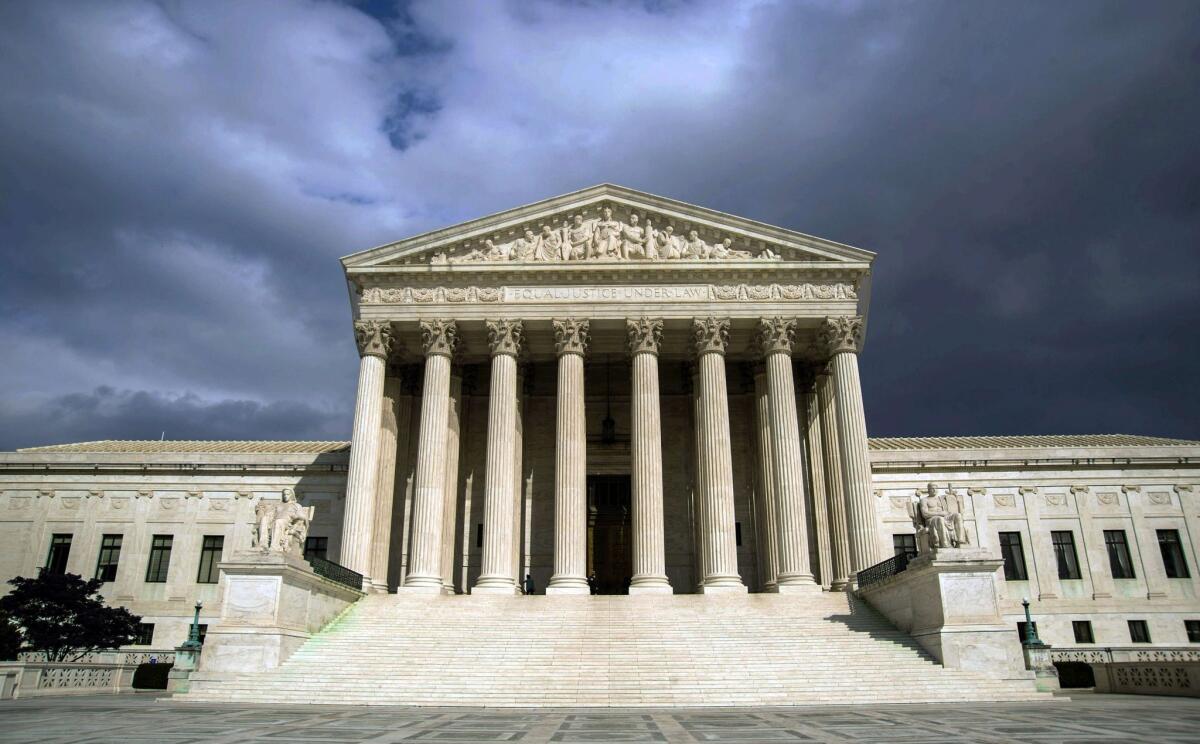Opinion: A lawyer’s ignorance of immigration law shouldn’t lead his client to deportation

The Supreme Court struck a blow for common sense today in a decision that will let a non-citizen back out of a plea deal his lawyer persuaded him to take even though it set him up for deportation – the one thing he was trying to avoid.
Jae Lee was born in South Korea and moved with his family to the United States in 1982 at age 13, eventually gaining lawful permanent resident status that gave him permission to live and work here. And work he did, forging a career as a successful restaurateur in Tennessee. Despite living here for more than three decades, Lee never got around to applying for U.S. citizenship.
Lee was arrested in 2008 on felony charges that he possessed and intended to sell the party drug ecstasy. He immediately worried that the charge could lead to his deportation, and repeatedly told his lawyer he wanted to avoid getting kicked out of the country.
Immigration law is complex and usually requires special legal training to understand the various nuances, but Lee’s lawyer wasn’t trained in immigration law. Even at the moment Lee was sentenced, the lawyer assured him that pleading guilty not only meant less prison time – a year and a day instead of up to five years if convicted at trial – but that it would not affect his immigration status.
The lawyer couldn’t have been more wrong, and Lee didn’t learn the cold, hard truth until he arrived at a prison designated for inmates who were to be kicked out of the country once their sentences were served.
Lee filed a legal challenge, arguing that his lawyer’s incompetence led him to take the plea bargain, a decision he otherwise would not have made since remaining in the country was his paramount interest. In fact, his lawyer later said that if he himself had properly understood the immigration laws, and that the plea would make Lee ineligible to remain in the country, he would have advised Lee to take his chances at trial.
At heart, the case is about everyone’s right to adequate and effective counsel in a criminal proceeding.
But the government argued, and lower courts agreed, that given the evidence against Lee, including 88 ecstasy pills they found at his house, he was going to get convicted anyway so the outcome didn’t harm him (so much for innocent until proven guilty). In fact, Lee wound up with less prison time out of the deal – and taking the deal would have been the rational decision because of that. But Lee had made clear to his lawyer, and later to the courts, that he was less concerned with a longer prison sentence than he was with the prospect of getting sent back to a country in which he had not set foot since 1982.
The Times’ editorial board sided with Lee earlier this year when the case went before the Supreme Court for oral arguments. The issue for us was a matter of basic fairness:
“The [lower court] decisions hinge on speculation about what would have happened at trial if Lee had rejected the plea bargain. Lee rightly argues that anything can happen in court — evidence could be suppressed, witnesses could change stories, fickle juries may not believe a prosecutor’s narrative. Lee, fearing deportation more than a few additional years of prison, argued that if he had understood the certainty that his guilty plea would lead to a deportation order, he would have either held out for a better plea bargain that wouldn’t have affected his legal status or rolled the dice at trial. His lawyer’s lack of legal knowledge meant Lee was unable to make the best decision for his defense, as is his right in a criminal proceeding.”
The Supreme Court agreed:
“Common sense (not to mention our precedent) recognizes that there is more to consider than simply the likelihood of success at trial. The decision whether to plead guilty also involves assessing the respective consequences of a conviction after trial and by plea…. When those consequences are, from the defendant’s perspective, similarly dire, even the smallest chance of success at trial may look attractive. For example, a defendant with no realistic defense to a charge carrying a 20-year sentence may nevertheless choose trial, if the prosecution’s plea offer is 18 years. Here Lee alleges that avoiding deportation was the determinative factor for him; deportation after some time in prison was not meaningfully different from deportation after somewhat less time. He says he accordingly would have rejected any plea leading to deportation — even if it shaved off prison time — in favor of throwing a ‘Hail Mary’ at trial….
“We cannot agree that it would be irrational for a defendant in Lee’s position to reject the plea offer in favor of trial. But for his attorney’s incompetence, Lee would have known that accepting the plea agreement would certainly lead to deportation. Going to trial? Almost certainly.”
Chief Justice John Roberts wrote the decision, and Justice Clarence Thomas wrote a dissent, joined by Justice Samuel Alito, arguing that letting Lee withdraw his plea based on his lawyer’s ignorance would open the door to future appeals by defendants unhappy with their lawyers, and their plea bargains. That could be the result, but so what? When a defendant can prove that he entered into a plea bargain under errant advice by his lawyer, and suffers a consequence he expressly intended to avoid, he should be able to withdraw the plea.
The court reached the right decision here. This case might have arisen from a deportation issue, but at heart, the case is about everyone’s right to adequate and effective counsel in a criminal proceeding.
To read the article in Spanish, click here
Follow my posts and re-tweets at @smartelle on Twitter
More to Read
A cure for the common opinion
Get thought-provoking perspectives with our weekly newsletter.
You may occasionally receive promotional content from the Los Angeles Times.







